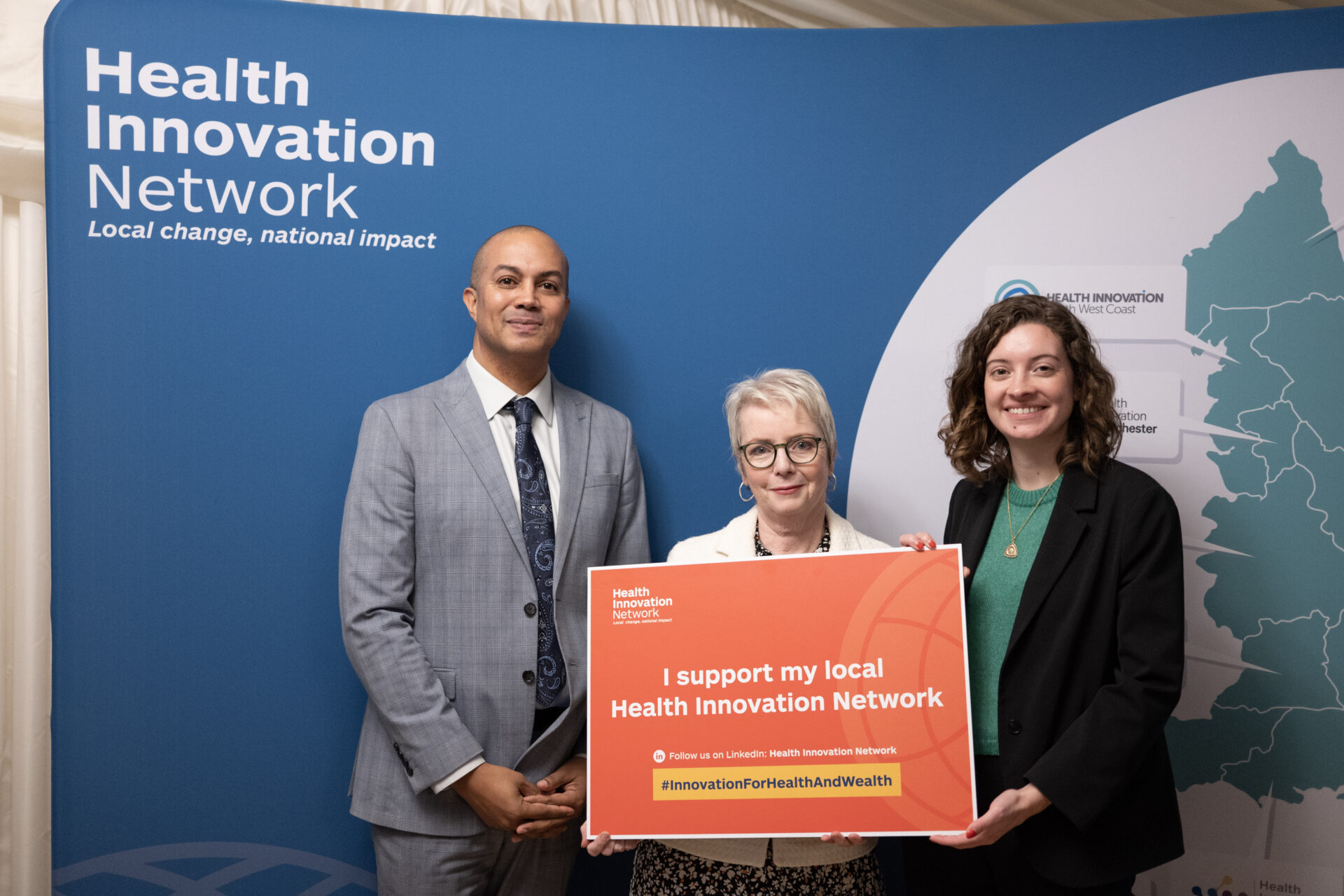Ambitious innovation is a team game and, as a Network, our best work has been delivered in partnership with a coalition of expertise from across the innovation ecosystem. One such partnership, is our collaborative working agreement with the National Institute of Health and Care Excellence (NICE).
We both want to see the most clinically and cost-effective approaches to care that solve priority needs in the NHS implemented and scaled up in the health and care system.
Our partnership aims to increase the collective impact of our respective organisations to improve healthcare and support innovators.
By working together, we ensure that we generate a high-quality pipeline of innovations that address NHS needs; we prioritise NHS and innovator support in areas with significant and promising benefits for patients and the NHS; NICE guidance and Network spread programmes focus on regional and ICS priorities and NICE guidance is useful and implementable by learning through uptake measurement and Network real world evaluations.
This ensures that the greatest resource is placed on supporting innovators whose solutions answer local unmet needs, which in turn supports the reduction of healthcare inequalities.
Meeting unmet needs
An example of how this agreement is working in practice is the NICE Early Value Assessment (EVA) for MedTech.
The EVA seeks to ‘enable accelerated patient access to promising innovations in the NHS through the expedited generation of real-world evidence supporting their adoption and spread’. As a Network we have been helping NICE to identify topics that align with real world ICS priorities; identifying companies and technologies using our dynamic Innovation Pipeline and supporting evidence generation plan development, including clinical and operational input, including supporting companies with data collection and implementation.
As a Network we can leverage our relationships with nationally recognised clinicians and operational teams to ensure the selection of topics align with real world challenge and priorities, and identify companies listed in our national innovation pipeline under each topic that could be eligible for the EVA programme.
All networks have direct access to clinical, operational and academic (e.g. Applied Research Collaboration) stakeholders at local, regional and national level that can contribute to the Evidence Generation Plan for each EVA. Furthermore, we have extensive experience bridging the gap between companies, NHS stakeholders and ARCs/academics to navigate the complexities of digital transformation and IG to ensure robust data collection for real world evidence generation and since 2018 we have delivered 100s of real-world validations, supporting sustained adoption and spread of innovations.
A recent example of how this has translated in practice is the NICE Virtual Wards for Acute Respiratory Infection Early Value Assessment. The Health Innovation Network added real world implementation experience and knowledge to the development of the EVA, by drawing on our learning gleaned during the Covid-19 pandemic, and the rapid roll-out of virtual wards across England. This knowledge and expertise has informed topic definition, technology selection and the development of NICE’s evidence generation plan.
Accelerating innovation
We are also taking a collaborative approach to support medical technology developer and innovators. Once the stage of development of the innovation has been understood and the need for support assessed, we can signpost seamlessly to each others’ innovator support programmes and offers, and jointly track progress.
NICE and the Health Innovation Network have taken steps to align the approaches for gathering real world evidence to support the adoption and spread of medical technologies. This means innovators and system stakeholders receiving health innovation network support can feel reassured that the evidence being generated will support the case for change. The real-world learning from Health Innovation Network spread and adoption programmes can also support NICE’s future guidance development, including the resource impact model tools that NICE develops to forecast the resource savings of medical technologies.
The reverse is also true, and we have embedded NICE colleagues in three of the Health Innovation Network Pipeline and Programme Clinical Working Groups: CVD, Respiratory and Mental Health, which is informing both guidance topic prioritisation and technology selection for NICE’s EVA programme, as-well as strengthening the Health Innovation Network’s national programme selection process through NICE input.
We anticipate that these areas of collaboration will accelerate the rate at which robustly evidenced, proven innovations are developed, validated and adopted by the health and care system, and we will continue to collaborate across these areas into 2024-25.
Learn more about our Network partnerships here, or contact us to find out more about how we can support your innovation needs.

Join us on 11 and 12 June in Manchester to find out how the Health Innovation Network is improving health and driving wealth through health innovation. This year we’ll be joined on our stand by 18 Network-supported innovators, showcasing innovations which are helping to deliver the Government’s three shifts for the NHS and solve some [...]

The Health Innovation Network is delighted to announce the launch of Innovation Insights, a brand-new webinar series designed to highlight the latest in health innovation, offering attendees valuable insights into the adoption and spread of innovation within the health and care landscape. Each interactive webinar will feature: Expert presentations: Delivered by thought leaders across [...]

The Health Innovation Network, at an event sponsored by Sarah Coombes MP, brought together parliamentarians including Health Minister Karin Smyth MP and Chair of the Science, Innovation and Technology Committee, Chi Onwurah MP to meet with six innovators supported by health innovation networks across the country and their NHS partners. At the Meet the Innovators: [...]






